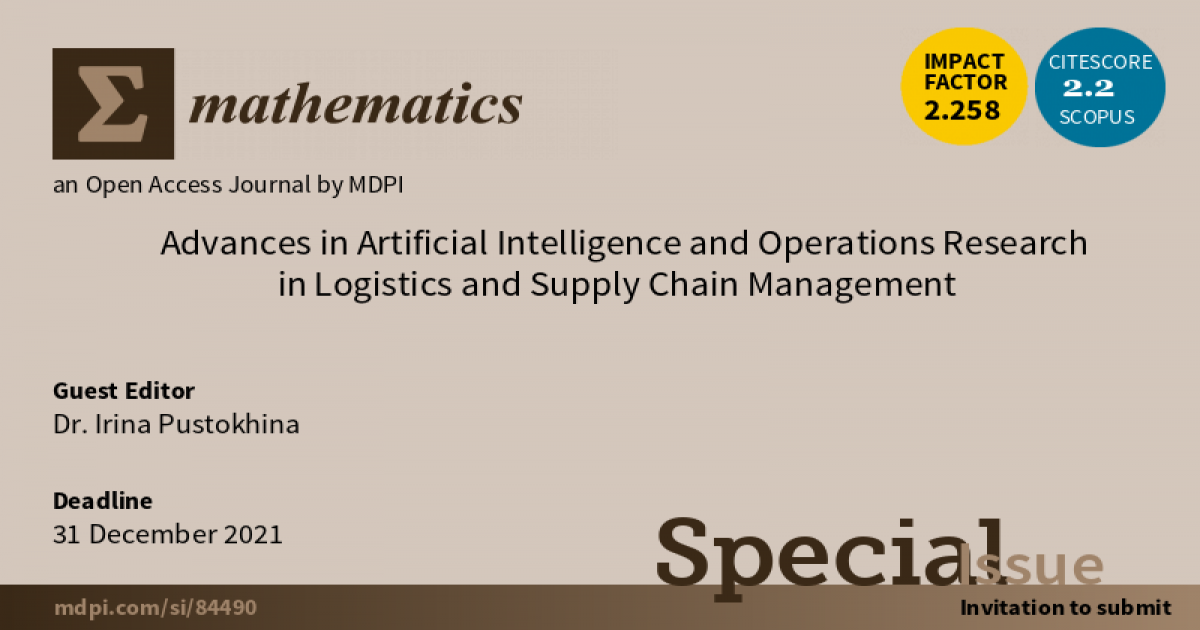- 2.2Impact Factor
- 4.6CiteScore
- 18 daysTime to First Decision
Advances in Artificial Intelligence and Operations Research in Logistics and Supply Chain Management
This special issue belongs to the section “E2: Control Theory and Mechanics“.
Special Issue Information
Dear Colleagues,
Nowadays, the increasing volume of information, as well as complexity around logistics and supply chain management, makes it imperative to jointly use optimization and artificial intelligence for devising data-driven and intelligent decision support approaches. A combination of AI with well-known OR methods offers the possibility to use synergies and advantages of both methods and lead to huge progress.
Recent trends illustrate that extensive research on different AI and OR techniques and their application in logistics and supply chain management need to be demonstrated. This Special Issue is designed to highlight recent theoretical and methodological advancements, case studies, applications, technical contributions, survey results and applications of tools and techniques to improve technical infrastructure in the application of AI and OR models to meet efficiency challenges and produce more cost-effective and sustainable solutions in logistics and supply chain management.
This Special Issue covers the following topics:
- Unmanned ground/aerial vehicles
- Blockchain technology supported supply chain operations
- Advantages and disadvantages of information transparency in supply chains
- Deep learning applications for all aspects related to logistics and supply chain management
- Emergency logistics
- Reverse logistics
- Freight transportation
- Metropolitan/city logistics
- Smart agro-logistics
- Internet of Things in smart logistics
- Port smart logistics
- Logistics 4.0
- E-commerce logistics
- The role of digital technologies in supporting, enabling, fostering or reshaping the logistics and supply chain management practice
- The role of innovative actors in integrating material flow, information flow and financial flow
Dr. Irina Pustokhina
Guest Editor
Manuscript Submission Information
Manuscripts should be submitted online at www.mdpi.com by registering and logging in to this website. Once you are registered, click here to go to the submission form. Manuscripts can be submitted until the deadline. All submissions that pass pre-check are peer-reviewed. Accepted papers will be published continuously in the journal (as soon as accepted) and will be listed together on the special issue website. Research articles, review articles as well as short communications are invited. For planned papers, a title and short abstract (about 250 words) can be sent to the Editorial Office for assessment.
Submitted manuscripts should not have been published previously, nor be under consideration for publication elsewhere (except conference proceedings papers). All manuscripts are thoroughly refereed through a single-blind peer-review process. A guide for authors and other relevant information for submission of manuscripts is available on the Instructions for Authors page. Mathematics is an international peer-reviewed open access semimonthly journal published by MDPI.
Please visit the Instructions for Authors page before submitting a manuscript. The Article Processing Charge (APC) for publication in this open access journal is 2600 CHF (Swiss Francs). Submitted papers should be well formatted and use good English. Authors may use MDPI's English editing service prior to publication or during author revisions.
Keywords
- Classical intelligent optimization algorithms
- Population-based intelligent algorithms
- Hybrid optimization
- Multi-objective optimization
- Big data
- Internet of Things
- Machine learning
- Artificial intelligence
- Operations research
- Logistics management
- Supply chain management

Benefits of Publishing in a Special Issue
- Ease of navigation: Grouping papers by topic helps scholars navigate broad scope journals more efficiently.
- Greater discoverability: Special Issues support the reach and impact of scientific research. Articles in Special Issues are more discoverable and cited more frequently.
- Expansion of research network: Special Issues facilitate connections among authors, fostering scientific collaborations.
- External promotion: Articles in Special Issues are often promoted through the journal's social media, increasing their visibility.
- e-Book format: Special Issues with more than 10 articles can be published as dedicated e-books, ensuring wide and rapid dissemination.

